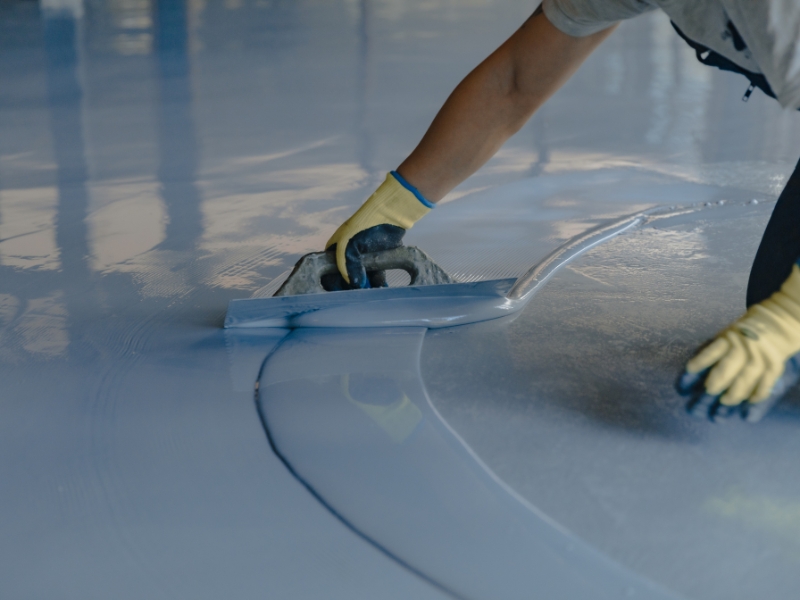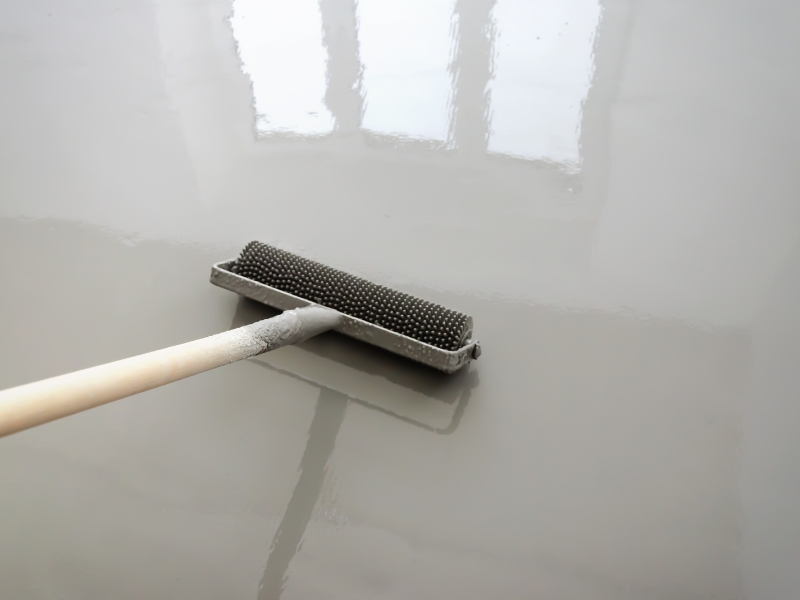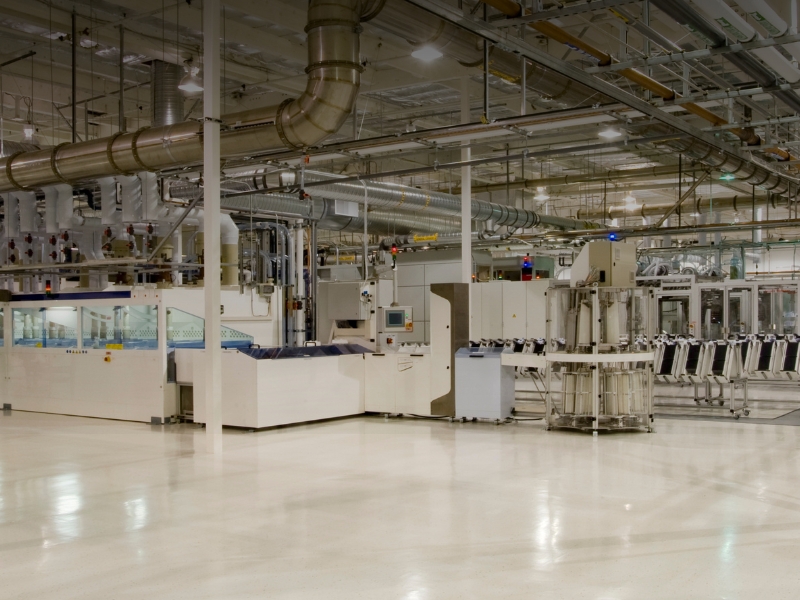Epoxy flooring has gained significant traction in various industries due to its durability and versatility. But can it hold up in the demanding environment of food processing facilities? This blog explores whether commercial epoxy flooring is viable for such settings, providing a comprehensive overview of its benefits, challenges, and specific applications.
What are the benefits of epoxy flooring for food processing facilities?
When considering flooring options for food processing facilities, epoxy flooring stands out for several reasons. Here’s why it might be the perfect fit for your needs:
- Durability: Epoxy flooring is known for its exceptional durability. It can withstand heavy machinery, constant foot traffic, and frequent cleaning without deteriorating.
- Chemical resistance: This type of flooring can resist spills and stains from chemicals, acids, and oils, which are common in food processing environments.
- Ease of cleaning: With a smooth, non-porous surface, epoxy flooring is easy to clean and maintain, which is crucial in maintaining hygiene standards.
- Safety: Epoxy floors can be customised with anti-slip additives, reducing the risk of accidents in wet or greasy conditions.
- Cost-effectiveness: Although the initial installation cost might be higher, epoxy flooring’s longevity and minimal maintenance needs can make it a cost-effective choice in the long run.
What are the unique challenges of food processing facilities?
Food processing facilities present unique challenges that any flooring system must address:
- High Moisture Levels: Frequent cleaning and liquid spillage can lead to moisture build-up, which may compromise the flooring if not properly managed. Flooring needs to handle these conditions without deteriorating.
- Sanitation Requirements: To prevent contamination, floors must be designed for easy cleaning and disinfection. A flooring system that facilitates thorough cleaning helps maintain high hygiene standards.
- Heavy Loads: Equipment and machinery in food processing facilities often exert significant weight and stress on the flooring. The flooring must be durable enough to withstand this heavy load without damage.
- Chemical Exposure: The flooring must resist various food processing and cleaning chemicals. It must maintain its integrity and appearance despite exposure to potentially harsh substances.
How durable is epoxy flooring for food processing environments?

Epoxy flooring is designed to endure the rigours of industrial environments, including food processing facilities. Here’s why it excels in terms of durability:
- Resistance to Physical Damage: Epoxy floors are built to handle heavy loads and impacts without cracking or peeling. This makes them ideal for environments with high traffic and heavy machinery.
- Chemical and Stain Resistance: Epoxy flooring can withstand spills from acids, oils, and other chemicals without showing signs of discolouration or degradation. This resistance ensures that the flooring maintains its integrity and appearance over time.
- Temperature Tolerance: Epoxy flooring can endure fluctuations in temperature, which is crucial in food processing facilities with varying temperature zones. Its ability to perform well under temperature changes ensures long-term reliability and durability.
How does epoxy flooring improve hygiene and safety in food processing?
In food processing facilities, hygiene and safety are paramount. Epoxy flooring contributes significantly in these areas:
- Seamless Surface: Epoxy flooring’s lack of joints and seams helps reduce the risk of bacterial growth and makes cleaning much more straightforward. This seamless design eliminates gaps where contaminants can accumulate, ensuring a more sanitary environment.
- Non-Porous Material: Epoxy flooring is non-porous, which prevents liquids and contaminants from penetrating the surface. This characteristic helps maintain a clean and hygienic floor, as spills and stains remain on the surface where they can be easily cleaned.
- Resistance to Mould and Mildew: Epoxy flooring’s inherent properties prevent the growth of mould and mildew. This is crucial in food processing settings, where controlling these harmful elements is essential for ensuring food safety and a healthy work environment.
What are the durability and longevity of epoxy flooring in food processing?

Epoxy flooring is renowned for its long-lasting performance. Here’s a breakdown of its longevity:
- Long-term performance: When installed and maintained correctly, epoxy flooring lasts 10 to 20 years or even longer. Its durability ensures it performs well in high-traffic and demanding environments, making it a reliable long-term investment.
- Minimal maintenance: Epoxy flooring requires minimal upkeep. Regular cleaning and occasional re-coating are needed to keep it in top condition. This low maintenance requirement helps reduce ongoing costs and effort.
- Cost efficiency: Although epoxy flooring has a higher initial cost, its durability leads to significant long-term savings. Its extended lifespan and minimal maintenance make it a more cost-effective choice than other flooring options.
Summary of the benefits of epoxy flooring for food processing
In summary, food-grade epoxy flooring or epoxy flooring provides a range of compelling advantages for food processing facilities:
- Exceptional durability and resistance to physical and chemical damage: Epoxy flooring is incredibly durable and can withstand heavy equipment, foot traffic, and constant use without showing signs of wear. It also resists damage from chemicals and spills, ensuring it remains functional and visually appealing.
- Ease of cleaning and maintenance, crucial for hygiene: Epoxy flooring’s non-porous, seamless surface makes it easy to clean and maintain, essential for maintaining high hygiene standards. This ease of cleaning helps prevent the build-up of contaminants and simplifies the sanitisation process.
- Customisation options to enhance safety and functionality: Epoxy flooring can be tailored with various additives and finishes to meet specific safety and operational needs. Options like anti-slip additives and food-grade formulations enhance safety and compliance with food safety regulations.
If you’re considering upgrading your flooring, epoxy might be the ideal choice for your food processing facility. Its durability, hygiene benefits, and customisation options make it a standout option for maintaining a safe and clean environment.
Ready to upgrade?
Are you ready to enhance your food processing facility with high-quality epoxy flooring? Contact Sydney Wide Epoxy Flooring today to explore your options and ensure your facility meets the highest standards of durability and hygiene. Whether you need epoxy flooring for commercial kitchens or any other space, we’ve got you covered.
For expert advice and top-notch service, contact Sydney Wide Epoxy Flooring—your go-to solution for all your epoxy flooring needs.

